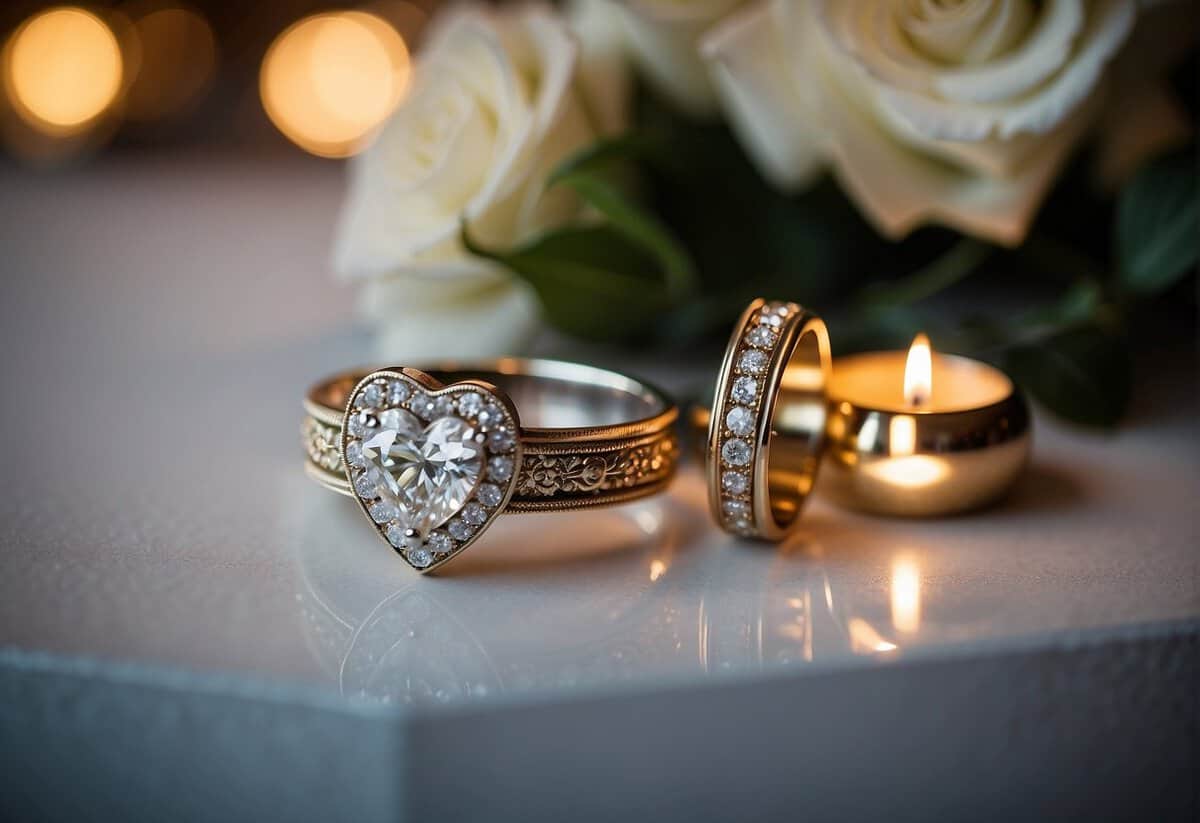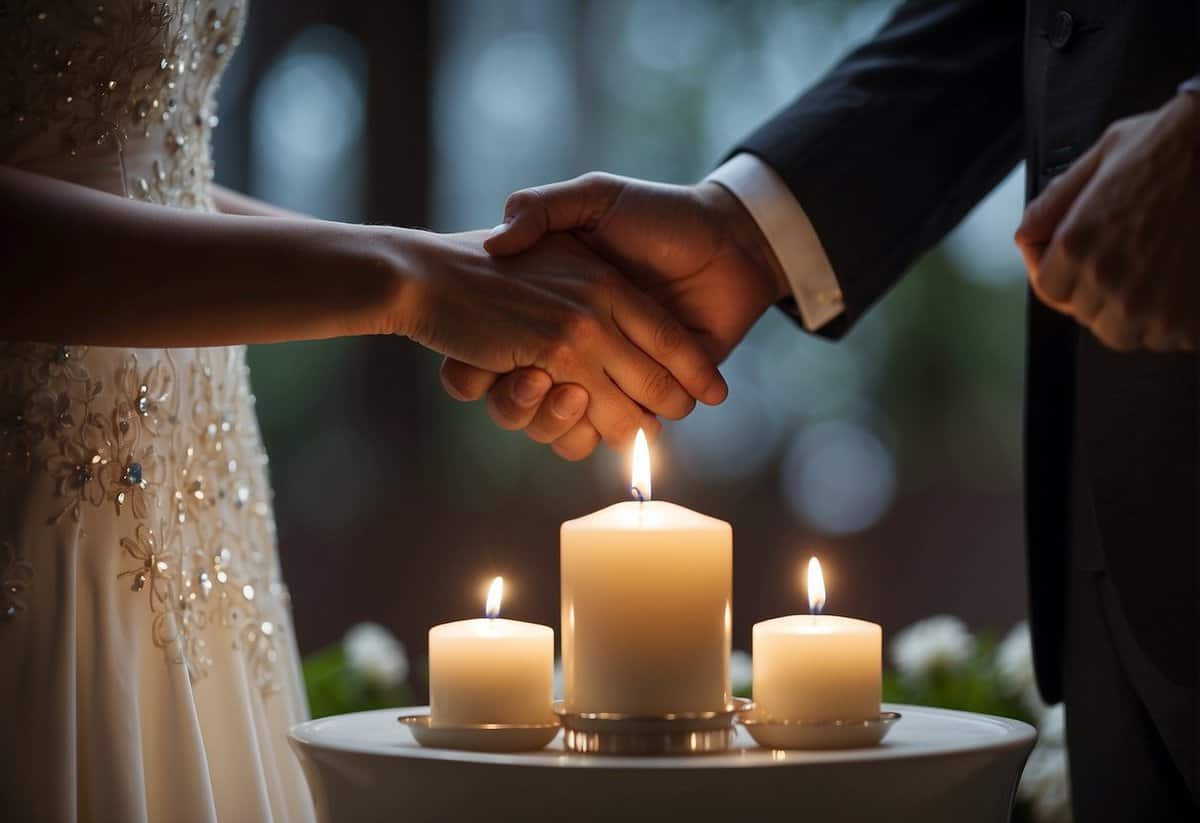What Are the Three Promises of Marriage? Unveiling Vows of Unity
Marriage is a significant institution that has, at its core, a set of promises or vows taken by two individuals on their wedding day. These promises are the foundation of the commitment that defines the marriage, symbolizing not just love, but a mutual pact to navigate life together through all its twists and turns. This relationship is bound by words that are meant to guide the couple as they uphold their personal and shared goals and responsibilities.

When you say your vows, you’re pledging your dedication to an enduring partnership. These age-old promises often revolve around three central themes: to love and cherish, for better or for worse, in sickness and in health. They form the cornerstone of the bond, urging both partners to support and respect one another, come what may. This is what sets the tone for the journey ahead, one that you will walk side by side.
Key Takeaways
- Marriage vows serve as guiding principles for a lasting partnership.
- The promises you make signify a steadfast commitment to mutual support.
- Understanding these pledges helps navigate the roles and responsibilities within marriage.
Understanding the Promises of Marriage

Marriage is more than a contract; it is a covenant that encompasses a wide range of commitments. These promises serve as the foundation for a robust partnership, reflecting shared values and the mutual pursuit of love and respect.
Commitment to Lifelong Partnership
Your marriage is a lifelong commitment symbolized by the promise to “have and to hold” from your wedding day forward, enduring until “death do us part.” This covenant declares an intent for a permanent and enduring unity as husband and wife.
Support Through Life’s Journey
Support is the cornerstone of the vows you make—to stand by each other “in sickness and in health” and through “better or worse.” This includes emotional support during the ups and downs of life, ensuring that neither of you feel alone.
Sharing of Values and Growth
A marriage thrives on shared values and beliefs. It’s about nurturing one another’s growth, both as individuals and as a couple, aligning your life paths to support your family and the creation that comes with it.
Foundation of Love and Respect
At the heart of your marriage should be a deep love and cherish, buttressed by mutual respect. These promises reflect a dedication to honor and hold your partner in high esteem, forming a bond that is fortified by sincere affection and devotion.
Spiritual and Religious Commitments
For those who practice, your marriage may be woven with spiritual and religious threads, pledging to foster a Christian family life built in the image of God, routinely engaging in worship and spiritual warfare together.
Fidelity and Exclusivity
Fidelity is a fundamental promise: to remain faithful, forsaking all others. It is a pledge of exclusivity, ensuring your partner that they are the only one for you in every aspect, fostering deep trust and security.
Co-Creation and Support
Together, you both become stewards of your life, acting in partnership to shape the world around you, be it through raising children, caring for the earth, or supporting each other’s contributions to society and the church.
Reflecting Christian Principles
In a Christian marriage, you aim to reflect Christ’s love in your relation, vowing to love and honor each other in a way that illuminates the love of God and serves as a beacon of hope and light to others.
Roles and Responsibilities in Marriage

In marriage, you and your spouse share a profound responsibility to uphold the pillars of your union: commitment, support, and shared spiritual values. These promises create a framework for mutual trust and a strong partnership.
Maintaining Commitment and Trust
Your marriage is built on a foundation of commitment and trust. It is vital for you and your partner to be faithful in both words and actions. This means being reliable and consistent in daily interactions, and communicating effectively to resolve conflicts. Establishing and following through on commitments, such as supporting each other in difficult times, reinforces the security of your relationship.
Providing Emotional and Physical Support
Offering emotional and physical support to each other ensures that your marriage remains a source of comfort and strength. This involves active listening, expressing care and love, and being attentive to your partner’s needs. In sickness and in health, remember that simple acts of kindness, like a reassuring hug or cooking a meal, can deeply nurture your bond.
Upholding Spiritual Beliefs and Practices
If your marriage is rooted in Christian values, then integrating spiritual beliefs and practices is a central role you both share. Attending church together, participating in prayer, and seeking spiritual guidance can cultivate unity and draw you closer. The Holy Spirit can offer profound guidance as you navigate life’s challenges together, so prioritizing your spiritual commitments can significantly enrich your marriage.
Marriage Vows and Their Significance

Marriage vows serve as the foundation of commitment in your partnership, forming not just a legal bond, but a personal and spiritual one. They are powerful promises made before friends, family, and often a higher power, encapsulating your dedication to foster a harmonious and loving relationship.
Traditional Wedding Vows Interpretation
When you exchange traditional wedding vows, you are participating in a historic practice, echoing the words of countless couples before you. The classic phrase “for better, for worse” underscores a willingness to stand by your partner through life’s unpredictability, reflecting the depth and resilience expected within the union.
Customizing Vows to Reflect Personal Commitment
You may choose to personalize your vows, crafting words that resonate with the unique qualities of your relationship. These personal vows become a reflection of your joint experiences, desires, and aspirations, allowing you to express sentiments that are solely yours, beyond what is traditionally memorized.
The Role of Vows in Christian Marriage
In the context of a church or a religious setting, Christian marriage vows may encompass specific teachings or scriptural references. The promise to “obey,” for instance, has evolved over time, reflecting a more mutual respect and partnership, indicative of modern Christian values.
Renewing Vows to Reaffirm Commitment
Couples often renew their vows to celebrate a milestone, such as a wedding anniversary, or simply to reaffirm their commitment to each other. This renewal of vows can reignite the passion and conviction of your promises, reminding you both of the journey you’ve shared and the continuity of your love.
Frequently Asked Questions

In understanding the tradition of marriage, often the vows taken at the altar reflect a couple’s commitment to each other. Here are some common inquiries about those promises that shape a lifetime together.
What vows are typically exchanged in a Christian wedding ceremony?
In Christian wedding ceremonies, vows typically revolve around the promises to love, cherish, and stay faithful to one another unconditionally across different walks of life.
What are the standard promises made during a Catholic marriage ritual?
During a Catholic marriage ritual, the couple commonly vows to hold each other, for better, for worse, for richer, for poorer, in sickness and in health, until death parts them.
Can you list traditional wedding vows found in the Bible?
Traditional wedding vows in the Bible are not explicitly listed as vows, but Genesis 2:18 speaks to the purpose of marriage, indicating companionship—where man and wife serve as suitable helpers to each other.
How do the seven vows of marriage differ from usual wedding promises?
The seven vows of marriage, particularly in Hindu traditions, expand on usual wedding promises with specific commitments for each stage of life, focusing on prosperity, strength, and love that reflect various aspects of marital life.
What script might a priest follow when conducting a wedding ceremony?
A priest might follow a script that includes asking the couple to express their consent, proclaim the marriage vows, and give and receive rings as symbols of their love and fidelity.
What are the core elements that constitute a marriage vow?
The core elements of a marriage vow include a pledge of love, fidelity, partnership, and mutual respect between two individuals who promise to face life together regardless of the circumstances.

